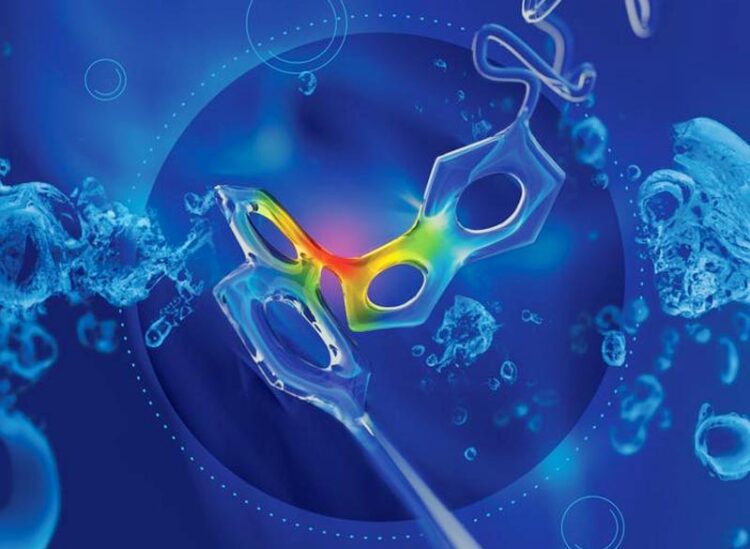Liverpool chemists solve long-standing polymer science puzzle

Artistic rendering of a polymer chain containing a molecular force probe (central structure) being distorted by the flow field around an imploding cavitation bubble (central circle).
Credit: Professor Roman Boulatov, University of Liverpool
Liverpool chemists make breakthrough in solving long-standing puzzle in polymer science.
New research by the University of Liverpool’s Chemistry Department represents an important breakthrough in the field of polymer science.
In a paper published in the journal Nature Chemistry and featuring on the front cover, Liverpool researchers use mechanochemistry to characterise how a polymer chain in solution responds to a sudden acceleration of the solvent flow around it.
This new approach allows a fundamental and technological question that has preoccupied polymer scientists for the past 50 years to be finally answered.
Since the 1980s researchers have been trying to understand the unique response of dissolved polymer chains to suddenly accelerating solvent flows but had been constrained to highly simplified solvent flows that provided limited exploitable insights into the behaviour of real-world systems.
The new discovery by Liverpool chemists Professor Roman Boulatov and Dr Robert O’Neill has significant scientific implications for several areas of physical sciences as well as at a practical level for polymer-based rheological control used in many multi-million dollar industrial processes such as enhanced oil and gas recovery, long distance piping and photovoltaics manufacturing.
Professor Roman Boulatov said: “Our finding addresses a fundamental and technical question in polymer science and potentially upends our current understanding of chain behaviour in cavitational solvent flows.”
Co-author of the paper, Dr Robert O’Neill added: “Our proof-of-the-approach demonstration reveals that our understanding of how polymer chains respond to sudden accelerations of solvent flows in cavitating solutions was too simplistic to support systematic design of new polymer structures and compositions for efficient and economical rheological control in such scenarios or for gaining fundamental molecular insights into flow-induced mechanochemistry.
“Our paper has important implications for our ability to study non-equilibrium polymer chain dynamics at the molecular length scales, and thus our capacity to answer fundamental questions of how energy flows between molecules and within them, and how it transforms from kinetic to potential to free energies.”
The research team plans to focus on expanding the scope and capabilities of their new method and exploiting it to map molecular-level physics that would allow accurate predictions of flow behaviour for an arbitrary combination of polymer, solvent and flow conditions.
The paper `Experimental quantitation of molecular conditions responsible for flow-induced polymer mechanochemistry’ (doi: 10.1038/s41557-023-01266-2) is published in Nature Chemistry.
These articles provide further detail of the authors’ research
Research highlight. Boulatov group @ the University of Liverpool
Mechanochemistry as a Tool of Polymer Physics | Chemistry Community (nature.com)
How polymers dance to the pulses of ultrasound
Journal: Nature Chemistry
DOI: 10.1038/s41557-023-01266-2
Article Title: Experimental quantitation of molecular conditions responsible for flow-induced polymer mechanochemistry
Media Contact
Sarah Stamper
University of Liverpool
sarah.stamper@liv.ac.uk
Cell: 07970247396
All latest news from the category: Life Sciences and Chemistry
Articles and reports from the Life Sciences and chemistry area deal with applied and basic research into modern biology, chemistry and human medicine.
Valuable information can be found on a range of life sciences fields including bacteriology, biochemistry, bionics, bioinformatics, biophysics, biotechnology, genetics, geobotany, human biology, marine biology, microbiology, molecular biology, cellular biology, zoology, bioinorganic chemistry, microchemistry and environmental chemistry.
Newest articles

How Industrial Robots are Reducing Emissions in Global Manufacturing
A new study explores the intersection of industrial automation and environmental sustainability, focusing on the role of industrial robots in reducing the carbon intensity of manufacturing exports. The research demonstrates…

Patients Can Heal Through Precise, Personalized Bioceramic Grafts
A recent review is transforming the landscape of craniomaxillofacial bone regeneration with the introduction of personalized bioceramic grafts. This pioneering research explores the fabrication and clinical potential of synthetic grafts…

Decoding Cancer: 40 Years of Breakthroughs in Genetic Research
Cancer in children and adolescents is rare. Nevertheless, malignant diseases are still one of the most common causes of death in this age group. Survivors of childhood or adolescent cancer…



